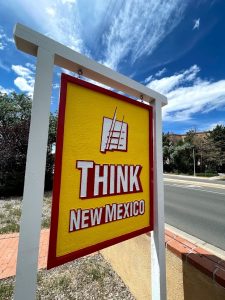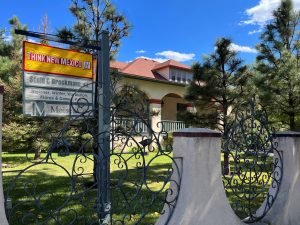 During the 2025 legislative session, Think New Mexico successfully championed the passage of five major reforms:
During the 2025 legislative session, Think New Mexico successfully championed the passage of five major reforms:
- Senate Bill 88, which creates a permanent trust fund for Medicaid. The fund will receive recurring revenue until it grows to $2 billion, allowing the state to increase the rates it pays providers to care for patients insured by Medicaid. Read more about this reform.
- House Bill 14, an omnibus tax bill that includes a repeal of the gross receipts tax on coinsurance, on top of the existing deduction for co-pays and deductibles. This will reduce state taxes on medical services by nearly $50 million annually. Read more about this reform.
- House Bill 157, which will raise the standards for principal training by creating a separate licensure track for school principals with enhanced mentoring and other support. Read more about this reform.
- House Bill 156, which ensures that New Mexico teachers will be trained in the best practices for how to effectively teach students how to read. Read more about this reform.
- Senate Bill 37, which enhances the Strategic Water Reserve, a water management tool that Think New Mexico first developed two decades ago to keep a little more water in New Mexico’s rivers. Read more about this reform.
 Think New Mexico has just released a new report proposing a ten-point plan with 20 separate legislative recommendations to address the urgent crisis of New Mexico’s health care worker shortage! Click here to read more about the reforms we’re proposing.
Think New Mexico has just released a new report proposing a ten-point plan with 20 separate legislative recommendations to address the urgent crisis of New Mexico’s health care worker shortage! Click here to read more about the reforms we’re proposing.
If you like what you read and you’d like to be part of this effort to revitalize public schools in New Mexico, please contact your legislators and the governor and urge them to enact these reforms during the upcoming 2025 legislative session!
We are excited to introduce our three newest staff members!
 Katie Gutierrez is Think New Mexico’s Tax, Budget, and Economic Development Reform Director. Katie is from San Antonito, New Mexico, where her family has been farming for 12 generations. A PhD candidate in Economics at the University of New Mexico, she studies the impact of taxes and policy changes on people’s health and well-being, with a focus on reducing health disparities. Katie is a Robert Wood Johnson Foundation Health Policy Research Scholar alumna, a UNM Center for Social Policy alumna, and a former organizer with the United Graduate workers of UNM.
Katie Gutierrez is Think New Mexico’s Tax, Budget, and Economic Development Reform Director. Katie is from San Antonito, New Mexico, where her family has been farming for 12 generations. A PhD candidate in Economics at the University of New Mexico, she studies the impact of taxes and policy changes on people’s health and well-being, with a focus on reducing health disparities. Katie is a Robert Wood Johnson Foundation Health Policy Research Scholar alumna, a UNM Center for Social Policy alumna, and a former organizer with the United Graduate workers of UNM.
 Marcus P. Lujan is Think New Mexico’s new Field Director. Marcus was born and raised in Santa Fe, where his family has lived for many generations. He served as his Class President at St. Michael’s High School, and is now an active member of the St. Michael’s Alumni Association. Marcus graduated with Honors from New Mexico State University, earning his Bachelor’s Degree in Government.
Marcus P. Lujan is Think New Mexico’s new Field Director. Marcus was born and raised in Santa Fe, where his family has lived for many generations. He served as his Class President at St. Michael’s High School, and is now an active member of the St. Michael’s Alumni Association. Marcus graduated with Honors from New Mexico State University, earning his Bachelor’s Degree in Government.
 Dr. Alfredo Vigil, is Think New Mexico’s Healthcare Reform Director. Alfredo served as New Mexico Secretary of Health under Governor Bill Richardson. He grew up in Los Alamos and earned his B.S. and M.D. from the University of New Mexico. During his career, Alfredo has been a physician in private practice, served as the medical director of the Questa Health Center, Chief of Staff of Holy Cross Hospital in Taos, and CEO of El Centro Family Health in Espanola, as well as Board Chair of the Planned Parenthood Federation of America.
Dr. Alfredo Vigil, is Think New Mexico’s Healthcare Reform Director. Alfredo served as New Mexico Secretary of Health under Governor Bill Richardson. He grew up in Los Alamos and earned his B.S. and M.D. from the University of New Mexico. During his career, Alfredo has been a physician in private practice, served as the medical director of the Questa Health Center, Chief of Staff of Holy Cross Hospital in Taos, and CEO of El Centro Family Health in Espanola, as well as Board Chair of the Planned Parenthood Federation of America.
 In 2024, Think New Mexico is celebrating its first quarter-century! Check out our latest annual report for for a timeline of the results we have achieved through the years as well as updates on our policy reform initiatives. Click here to download the annual report.
In 2024, Think New Mexico is celebrating its first quarter-century! Check out our latest annual report for for a timeline of the results we have achieved through the years as well as updates on our policy reform initiatives. Click here to download the annual report.
 During the 2024 legislative session, 54 education-related bills were introduced, just four of which made it through the process and were signed into law. One of those bills was Senate Bill 137, which enacted the reforms proposed in Think New Mexico’s Education Roadmap report to upgrade the training and transparency of the state’s school boards. Read more about this reform.
During the 2024 legislative session, 54 education-related bills were introduced, just four of which made it through the process and were signed into law. One of those bills was Senate Bill 137, which enacted the reforms proposed in Think New Mexico’s Education Roadmap report to upgrade the training and transparency of the state’s school boards. Read more about this reform.
While we were unsuccessful in getting a one-semester course in financial literacy included in the high school graduation requirements for all students, we are now reaching out to each of New Mexico’s 89 school districts and urging them to adopt financial literacy as one of the two graduation requirements that they have to establish at the local level. We are joined in this effort by a broad-based and growing coalition.
In addition, the 2024 capital outlay bill included an additional $1 million for the Strategic Water Reserve, the water management tool that Think New Mexico successfully championed nearly two decades ago to keep our rives running to prevent conflicts over endangered species and interstate river compacts. The 2024-2025 budget also extended the timeline for the $7,500,000 appropriation to the Strategic Water Reserve from last year, allowing it to be expended through 2028. Read more about this reform.
 The 2024 legislative session is underway, and we are working to enact more of the potentially transformative education reforms we proposed in our 2022 policy report, A Roadmap for Rethinking Public Education in New Mexico. Here are brief summaries of the bills we are currently working on, with links to our Action Center so you can easily contact your legislators and the governor about any of them:
The 2024 legislative session is underway, and we are working to enact more of the potentially transformative education reforms we proposed in our 2022 policy report, A Roadmap for Rethinking Public Education in New Mexico. Here are brief summaries of the bills we are currently working on, with links to our Action Center so you can easily contact your legislators and the governor about any of them:
- Upgrade the training and transparency of local school boards. We are advocating for Senate Bill 137, which would upgrade the training and transparency requirements of local school boards. A growing body of research has found that the decisions and actions of local school boards can positively impact the learning environment when school boards are focused on elevating student achievement. Read more about this reform and email your legislators and the governor to urge them to pass it!
- Reduce elementary school classes sizes. We are supporting House Bill 227 to phase in a cap of 20 students in grades K-6, one grade per year over six years. Smaller class sizes enhance the positive impacts of extended learning time by allowing teachers to spend more time with each student and provide more personalized instruction. They also reduce teacher stress and burnout, keeping more good teachers in the profession. Read more about this reform and email your legislators and the governor to urge them to pass it!
- Make personal finance a high school graduation requirement. Today, only 11% of students complete this course, but every student needs to learn essential skills like how to make a budget, open a bank account, save and invest for their futures, and avoid high-cost debt. We are urging lawmakers to include a one-semester class in financial literacy in the high school graduation requirements. Read more about this reform and email your legislators and the governor about it!
- Ensure high-quality teacher preparation programs. We are advocating for House Bill 256, which would set high standards for the state’s public colleges of education. The number of people completing traditional teacher training programs at New Mexico’s colleges of education has fallen by 75% over the past decade, and graduates report that the programs too often emphasize abstract theory over the practical, skills-based learning that is most valuable to future teachers. House Bill 256 would convert the final year of a four-year program into a teacher residency, a paid year-long experience in a classroom teaching alongside a master teacher. It would also ensure that they are offering evidence-based curricula that reflects the current best practices in areas like math and reading instruction. Read more about this reform and email your legislators and the governor to urge them to pass it!
- Improve school principal pay and training. Principal quality is the second most most important factor after teacher quality in student success, because good principals are the key to recruiting and retaining good teachers. Unfortunately, New Mexico is one of the ten worst states for principal retention, with principals remaining in their jobs for less than four years on average. Among the main reasons why principals leave their jobs are inadequate preparation and low salaries. House Bill 22 would ensure that incoming principals have access to residencies, where they have the opportunity to shadow an experienced principal for a year. It would also improve principal pay. Read more about this reform and email your legislators and the governor about it!
- Fund the Strategic Water Reserve. The Strategic Water Reserve is an innovative water management tool that Think New Mexico proposed and won passage of in 2005. It allows the state to buy and lease water rights to help keep our rivers flowing to meet the needs of endangered species and the state’s water delivery obligations under interstate compacts. Read more about this reform and email your legislators and the governor to ask them to fully fund it!
 On January 1, 2024, Think New Mexico marked 25 years since its founding.
On January 1, 2024, Think New Mexico marked 25 years since its founding.
We are proud of the track record of results that Think New Mexico has delivered for New Mexicans in our first quarter century, from repealing the food tax to ending predatory lending to making full-day kindergarten accessible to every child in the state. We have some exciting plans in the works to magnify our impact over the next quarter century, and we look forward to sharing more information about them throughout 2024.
 One of Think New Mexico’s priorities during the upcoming legislative session will be to win passage of legislation phasing in a cap of 20 students per class in grades 1-6. We would phase this class size cap in over six years, one grade per year, to allow ample time to plan for funding, space, and staff. Smaller classes improve student performance for at-risk students and also help keep good teachers in the profession longer. Yet in the 2022-23 school year, 27% of New Mexico’s elementary school classes exceeded limits and average targets set in current state law.
One of Think New Mexico’s priorities during the upcoming legislative session will be to win passage of legislation phasing in a cap of 20 students per class in grades 1-6. We would phase this class size cap in over six years, one grade per year, to allow ample time to plan for funding, space, and staff. Smaller classes improve student performance for at-risk students and also help keep good teachers in the profession longer. Yet in the 2022-23 school year, 27% of New Mexico’s elementary school classes exceeded limits and average targets set in current state law.
Read more about why this reform is so important in a recent guest editorial by our Education Reform Director Mandi Torrez and click here to contact your legislators and the governor about this reform.
 Our deep thanks go out to the dozen extremely generous New Mexicans who put together a pool of challenge grants totaling $170,000, and to the 373 New Mexicans who helped us more than match that challenge!
Our deep thanks go out to the dozen extremely generous New Mexicans who put together a pool of challenge grants totaling $170,000, and to the 373 New Mexicans who helped us more than match that challenge!
Including both the challenge grants and your matching contributions, during Think New Mexico’s annual online fundraising campaign between October 2-16, 2023, you helped us raise $333,365, which is nearly 44% of Think New Mexico’s annual budget.
The main challenge of $135,000, which was offered by 11 challenge grantors, was more than matched dollar for dollar by $144,089 from 312 donors.
A separate challenge of $35,000 offered a 2:1 match for new donors, new Monthly Amigos, and returning donors who hadn’t given in the last five years (since 2018 or earlier). This challenge was matched by $19,276 from 44 first-time donors, eight donors who had not given since 2018, and nine new Monthly Amigos. With the 2:1 match, those donations leveraged every single dollar of the $35,000 challenge grant!
Since Think New Mexico was founded in 1999, we have always worked hard to keep our fundraising expenses to an absolute minimum. That’s why we have never employed a professional fundraiser or held a physical fundraising event. This strategy has succeeded thanks to all of you who give so generously during our two-week fund drive every year and make it possible for Think New Mexico’s small staff to spend the rest of the year focused on our policy research and advocacy work.
 As of June 1, 2023, Think New Mexico can be found in its new permanent headquarters in the historic Greer House at 505 Don Gaspar in Santa Fe, at the corner of Paseo de Peralta and Don Gaspar, just down the block from our previous office and directly across the street from the state Capitol.
As of June 1, 2023, Think New Mexico can be found in its new permanent headquarters in the historic Greer House at 505 Don Gaspar in Santa Fe, at the corner of Paseo de Peralta and Don Gaspar, just down the block from our previous office and directly across the street from the state Capitol.
The Greer House was constructed in 1909 by Nathan Salmon (1866-1941), who emigrated to the United States from Syria at the age of 21. He traveled the Southwestern U.S. peddling goods from a wagon, and on one trip, he ended up stranded by a snowstorm in Santa Fe. He stayed and prospered, opening the Big Dry Goods store on San Francisco Street and ultimately developing a real estate business with his son-in-law, E. John Greer. Together they built the Lensic Theater.

Throughout its history, the Greer House served as a gathering place for New Mexico governors, legislators, and judges. (The home was even the setting for the 1942 wedding reception of Zsa Zsa Gabor and Conrad Hilton, the hotel magnate and former Republican legislator who originally hailed from Socorro.) In its next chapter as Think New Mexico’s headquarters, the tradition of policymakers and state leaders meeting in the Greer House will continue.
Think New Mexico’s purchase of the Greer House is fully funded, primarily by three sources. First, an anonymous donor, who was inspired by the results that Think New Mexico has achieved, contributed $1 million. Second, Think New Mexico raised $900,000 from the sale of a six-acre parcel of land in Taos that was gifted to the organization several years ago. Finally, the remaining funds will be generated by leasing the extra offices in the Greer House that Think New Mexico is not currently occupying.
 Think New Mexico’s purchase of the Greer House came after an extensive search and consideration of 21 different properties in the South Capitol area. The Greer House met the three essential criteria Think New Mexico was seeking in a permanent headquarters. First, it has close proximity to the Roundhouse, which facilitates Think New Mexico’s regular meetings with policymakers. Second, the Greer family has taken extraordinary care of the property over the last century, particularly Nathan Salmon’s great-grandson Freddie Soldow, who has cared for it for the last 23 years, so that it is in move-in condition. Finally, the Greer House is large enough to allow Think New Mexico to grow our staff over time and magnify our impact for New Mexicans.
Think New Mexico’s purchase of the Greer House came after an extensive search and consideration of 21 different properties in the South Capitol area. The Greer House met the three essential criteria Think New Mexico was seeking in a permanent headquarters. First, it has close proximity to the Roundhouse, which facilitates Think New Mexico’s regular meetings with policymakers. Second, the Greer family has taken extraordinary care of the property over the last century, particularly Nathan Salmon’s great-grandson Freddie Soldow, who has cared for it for the last 23 years, so that it is in move-in condition. Finally, the Greer House is large enough to allow Think New Mexico to grow our staff over time and magnify our impact for New Mexicans.
 During the 2025 legislative session, Think New Mexico successfully championed the passage of five major reforms:
During the 2025 legislative session, Think New Mexico successfully championed the passage of five major reforms:
 Think New Mexico has just released
Think New Mexico has just released  Katie Gutierrez is Think New Mexico’s Tax, Budget, and Economic Development Reform Director. Katie is from San Antonito, New Mexico, where her family has been farming for 12 generations. A PhD candidate in Economics at the University of New Mexico, she studies the impact of taxes and policy changes on people’s health and well-being, with a focus on reducing health disparities. Katie is a Robert Wood Johnson Foundation Health Policy Research Scholar alumna, a UNM Center for Social Policy alumna, and a former organizer with the United Graduate workers of UNM.
Katie Gutierrez is Think New Mexico’s Tax, Budget, and Economic Development Reform Director. Katie is from San Antonito, New Mexico, where her family has been farming for 12 generations. A PhD candidate in Economics at the University of New Mexico, she studies the impact of taxes and policy changes on people’s health and well-being, with a focus on reducing health disparities. Katie is a Robert Wood Johnson Foundation Health Policy Research Scholar alumna, a UNM Center for Social Policy alumna, and a former organizer with the United Graduate workers of UNM. Marcus P. Lujan is Think New Mexico’s new Field Director. Marcus was born and raised in Santa Fe, where his family has lived for many generations. He served as his Class President at St. Michael’s High School, and is now an active member of the St. Michael’s Alumni Association. Marcus graduated with Honors from New Mexico State University, earning his Bachelor’s Degree in Government.
Marcus P. Lujan is Think New Mexico’s new Field Director. Marcus was born and raised in Santa Fe, where his family has lived for many generations. He served as his Class President at St. Michael’s High School, and is now an active member of the St. Michael’s Alumni Association. Marcus graduated with Honors from New Mexico State University, earning his Bachelor’s Degree in Government. Dr. Alfredo Vigil, is Think New Mexico’s Healthcare Reform Director. Alfredo served as New Mexico Secretary of Health under Governor Bill Richardson. He grew up in Los Alamos and earned his B.S. and M.D. from the University of New Mexico. During his career, Alfredo has been a physician in private practice, served as the medical director of the Questa Health Center, Chief of Staff of Holy Cross Hospital in Taos, and CEO of El Centro Family Health in Espanola, as well as Board Chair of the Planned Parenthood Federation of America.
Dr. Alfredo Vigil, is Think New Mexico’s Healthcare Reform Director. Alfredo served as New Mexico Secretary of Health under Governor Bill Richardson. He grew up in Los Alamos and earned his B.S. and M.D. from the University of New Mexico. During his career, Alfredo has been a physician in private practice, served as the medical director of the Questa Health Center, Chief of Staff of Holy Cross Hospital in Taos, and CEO of El Centro Family Health in Espanola, as well as Board Chair of the Planned Parenthood Federation of America. In 2024, Think New Mexico is celebrating its first quarter-century! Check out our latest annual report for for a timeline of the results we have achieved through the years as well as updates on our policy reform initiatives.
In 2024, Think New Mexico is celebrating its first quarter-century! Check out our latest annual report for for a timeline of the results we have achieved through the years as well as updates on our policy reform initiatives.  The 2024 legislative session is underway, and we are working to enact more of the potentially transformative education reforms we proposed in our 2022 policy report,
The 2024 legislative session is underway, and we are working to enact more of the potentially transformative education reforms we proposed in our 2022 policy report,  On January 1, 2024, Think New Mexico marked 25 years since its founding.
On January 1, 2024, Think New Mexico marked 25 years since its founding. One of Think New Mexico’s priorities during the upcoming legislative session will be to win passage of legislation phasing in a cap of 20 students per class in grades 1-6. We would phase this class size cap in over six years, one grade per year, to allow ample time to plan for funding, space, and staff. Smaller classes improve student performance for at-risk students and also help keep good teachers in the profession longer. Yet in the 2022-23 school year, 27% of New Mexico’s elementary school classes exceeded limits and average targets set in current state law.
One of Think New Mexico’s priorities during the upcoming legislative session will be to win passage of legislation phasing in a cap of 20 students per class in grades 1-6. We would phase this class size cap in over six years, one grade per year, to allow ample time to plan for funding, space, and staff. Smaller classes improve student performance for at-risk students and also help keep good teachers in the profession longer. Yet in the 2022-23 school year, 27% of New Mexico’s elementary school classes exceeded limits and average targets set in current state law. As of June 1, 2023, Think New Mexico can be found in its new permanent headquarters in the historic Greer House at 505 Don Gaspar in Santa Fe, at the corner of Paseo de Peralta and Don Gaspar, just down the block from our previous office and directly across the street from the state Capitol.
As of June 1, 2023, Think New Mexico can be found in its new permanent headquarters in the historic Greer House at 505 Don Gaspar in Santa Fe, at the corner of Paseo de Peralta and Don Gaspar, just down the block from our previous office and directly across the street from the state Capitol.
 Think New Mexico’s purchase of the Greer House came after an extensive search and consideration of 21 different properties in the South Capitol area. The Greer House met the three essential criteria Think New Mexico was seeking in a permanent headquarters. First, it has close proximity to the Roundhouse, which facilitates Think New Mexico’s regular meetings with policymakers. Second, the Greer family has taken extraordinary care of the property over the last century, particularly Nathan Salmon’s great-grandson Freddie Soldow, who has cared for it for the last 23 years, so that it is in move-in condition. Finally, the Greer House is large enough to allow Think New Mexico to grow our staff over time and magnify our impact for New Mexicans.
Think New Mexico’s purchase of the Greer House came after an extensive search and consideration of 21 different properties in the South Capitol area. The Greer House met the three essential criteria Think New Mexico was seeking in a permanent headquarters. First, it has close proximity to the Roundhouse, which facilitates Think New Mexico’s regular meetings with policymakers. Second, the Greer family has taken extraordinary care of the property over the last century, particularly Nathan Salmon’s great-grandson Freddie Soldow, who has cared for it for the last 23 years, so that it is in move-in condition. Finally, the Greer House is large enough to allow Think New Mexico to grow our staff over time and magnify our impact for New Mexicans.